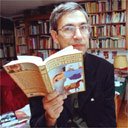 Turkish novelist Orhan Pamuk on the importance on the novel to a society in this piece printed in today's Guardian.
Turkish novelist Orhan Pamuk on the importance on the novel to a society in this piece printed in today's Guardian.Modern societies, tribes and nations do their deepest thinking about themselves through reading novels; through reading novels, they are able to argue about who they are; so even if we have picked up a novel hoping only to divert ourselves, and relax, and escape the boredom of everyday life, we begin, without realising, to conjure up the collectivity, the nation, the society to which we belong.Pamuk himself faces prosecution next month for referring to his country's massacre of the Armenians.This is also why novels give voice not just to a nation's pride and joy, but also to its anger, its vulnerabilities, and its shame. It is because they remind readers of their shame, their pride, and their tenuous place in the world that novelists still arouse such anger, and what a shame it is that we still see outbursts of intolerance - that we still see books burned, and novelists prosecuted.
4 comments:
Pamuk is fascinating on this subject, but sadly this discussion of all things literary has more recently become a political one. To discuss how this has taken effect come and discuss the finer points at thesamovar.blogspot.com I think this whole issue has enormous ramifications for Turkey’s position in the EU. Pamuk has become a bugbear for both those Turks who want to enter the EU and those Europeans who would have them join. The real interesting issue however is to note how he is used as a lever for both sides trying to exclude Turkey, and how dangerous this could be.
Thanks for this. I headed over to your blog and found an extremly well-argued piece that put the court case in a context for me ...
how true it is!...i read fiction purely for pleasere...but along the way you pick up things...it colours your outlook...it changes you...you become a don quixote...
for better or worse...
Yow.. how boilerplate can you get ?
"Modern societies, tribes and nations do their deepest thinking about themselves through posting; through making posts, they are able to argue about who they are; so even if we have made a post hoping only to divert ourselves, and relax, and escape the boredom of everyday life, we begin, without realising, to conjure up the collectivity, the nation, the society to which we belong.
This is also why posts give voice not just to a nation's pride and joy, but also to its anger, its vulnerabilities, and its shame. It is because they remind readers of their shame, their pride, and their tenuous place in the world that posters still arouse such anger, and what a shame it is that we still see outbursts of intolerance - that we still see posts deleted, and posters prosecuted."
Post a Comment